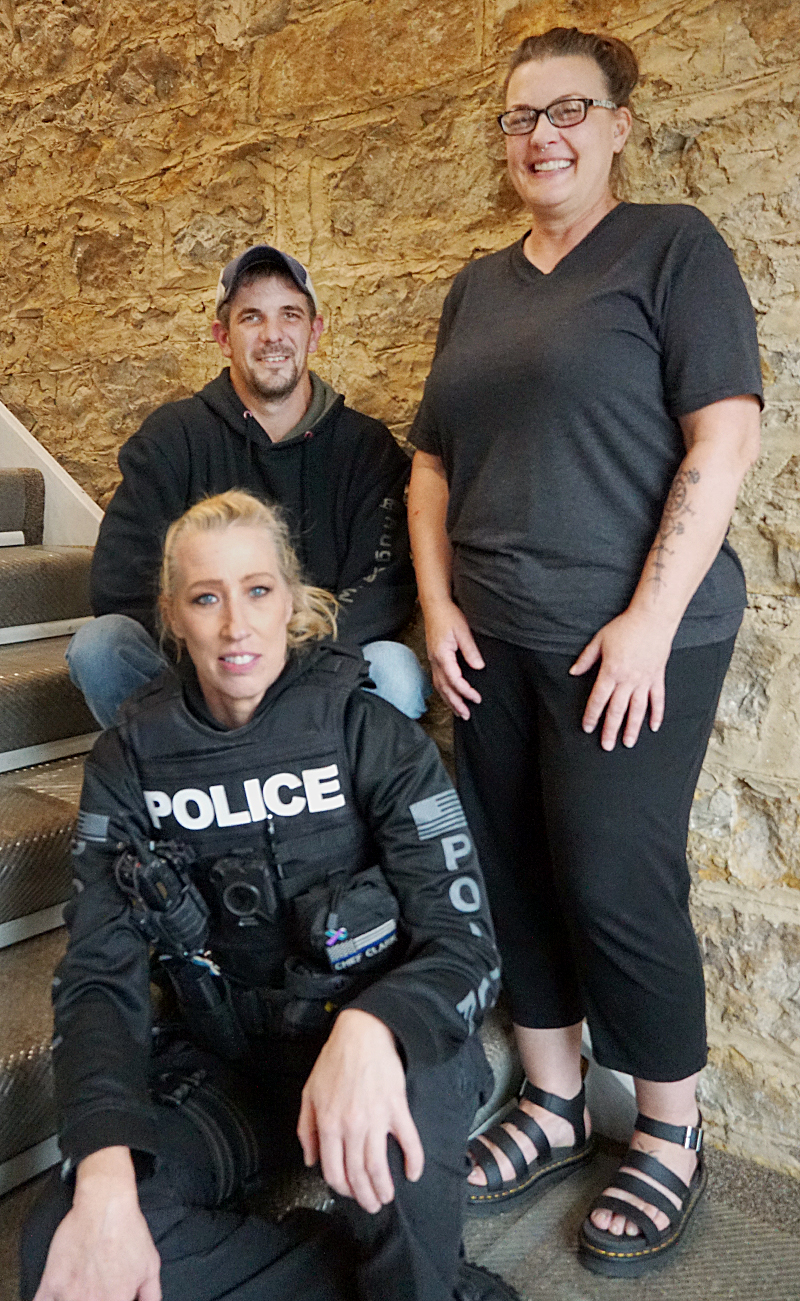Chief of Police Carrie Clark and program founders Jeramie Scherer and Whitney Collier are working together to build a system of local community support for those in need.
by Holly Allen
Oftentimes mental health issues and substance abuse disorders occur in tandem. In many cases, one is thought to beget the other. In rural areas, like the small towns of Jefferson County, help for these matters can be hard to find, which may leave those suffering to feel isolated. In an effort to remedy that, community-based therapies are soon to be available right here at Valley Falls.
Recovering Wellness in the Valley, a 16-week group program to develop a wellness toolbox of coping skills for anger, sadness, anxiety, and feeling overwhelmed, is set to begin Wednesday, Dec. 6.
This first class will provide space for 20 participants to devote 48 contact hours to learning their personal strengths and weaknesses and creating a wellness action plan. Sixteen of those hours will be devoted to mental health, alcohol, and drug awareness. Speakers from the community will share their experiences with living in recovery.
Chief of Police Carrie Clark, and Wellness in the Valley program founders Whitney Collier and Jeramie Scherer have been working together to build a system of local community support for those in need.
Collier, owner of Ravens’ Well, Atchison, has over 20 years experience in human services, and is herself a person in long-term recovery. Her desire is to bring healing to communities through sustainable and holistic practices, which she both utilizes and teaches to others. While her focus is on addicts, she also shares her services to help those suffering from what she terms “dis-ease” in their lives.
“I don’t turn anyone away,” Collier said. “I want to connect with people who have issues which need to be addressed; to treat the core issues which are causing the undesirable behaviors. My desire is to bring that healing back to a community level.”
Her practice focuses on a combination of identifying personal strengths, motivational interviewing, cognitive behavioral training, dialectical behavior therapy, positive behavior support, behavior analysis and sensory integration techniques to deliver care. Ultimately, she strives to provide the individual with wellness techniques they can utilize when they are starting to feel out of center.
“When people are in the throes of dis-ease, they tend to isolate, to pull away from others,” Collier said. “We want to try and get them reintegrated using the community support system that exists right here for them.”
The idea for the program came about through meetings Chief Clark had with Scherer, who has been in long-term recovery for nine years, and works locally to support area addicts. It is their belief that being proactive rather than reactive is the best practice, and they have worked together to approach those in the community who have been responsive to help.
“The drugs are here, they’re everywhere,” said Chief Clark. “But mental health is a huge part of this too, and it isn’t being addressed. There are so many who struggle with this. We want you to know, we want to help. We want to see you thriving in this community.”
Scherer believes the police chief’s strategy may just save lives. And, “if people know what she is doing, they might reach out for help.”
“I’ve been in recovery a long time and I’ve never seen a police chief so involved in trying to help her community. She is reaching out to people instead of throwing the book at them,” stated Scherer of Chief Clark. “She is handling each situation as a person who cares, not as just a person of authority.”
It was Scherer who brought Collier in to help with their endeavors.
“I am nine years recovered, and (Collier) helped me tremendously in that recovery. She will put as much into your recovery as you do,” stated Scherer. “This is my community. I care about the people in it. I want to help them at their worst to see them at their best. There is nothing more rewarding than helping those around you find enough value in themselves to find recovery.”
The group meets weekly toward aims such as searching for grants to obtain substance abuse counselors for the department that the county jail could also utilize, talking with doctors to get them involved locally, and working to create ways to be proactive in using every tool available, which admittedly isn’t much in a small town.
Thus Wellness in the Valley was created — an organized way of supporting those in the community who are ready to seek help for their mental health and addiction issues.
Though the program is comprised of primarily closed sessions, parents, family members, and other members of the community will be welcome for a segment. Peer models will offer support in transitioning learned insights into everyday practice.
Recovery models of the 12 steps and Red Road to Wellbriety programs will be introduced. Completion of the 16-week program will fill the requirement of a basic 12-step program for those obligated to complete one.
Participants are required to commit to all 16 sessions, which will take place in the Kendall Bank Community Room from 6 to 8 p.m. Wednesdays, with two lengthier Saturday sessions thrown in. Pre-registration with a deposit is required by Nov. 30 to attend Wellness in the Valley, and each of the 16-week group sessions will cost $22. A discount is applied for paying for the program in its entirety up front. You can register by contacting Collier at whitney@ravenswell.com.
“This program is for any person who currently feels stuck and wishes things were different,” Collier said. “If you don’t like where you’re at and don’t know how to adjust, we can provide the support for you to take the next step. Don’t underqualify yourself for the help you need.”


